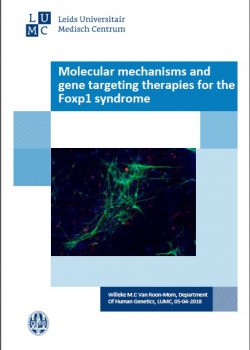The LUMC, under supervision of Prof. W Van Roon will conduct the research.
Haploinsufficiency of the forkhead-box protein P1 (FOXP1) gene causes a broad neurodevelopmental syndrome involving global developmental delay, intellectual disability (ID), speech/language impairment, and autistic features (MIM# 613670) [1]. A recent paper on the mutational landscape of FOXP1 described 34 private mutations and a further 7 mutations that were present in unrelated individuals [2]. Of the 7 recurring mutations, five were located in the DNA binding domain and one in the Zinc Finger domain of the FOXP1 protein.

Studying human brain development and the pathobiology of brain disorders has traditionally been hampered by appropriate cell culture models. The possibility of generating patient-derived IPSC lines followed by differentiation into desired cell types can provide new insights into disease mechanisms and can facilitate translation of basic brain research into clinical application. Especially the application of human iPSC-derived, 3D brain organoids, that reflect many features of complex human brain development is promising for the study of FOXP1 protein function and the pathological consequences of the mutation in the DNA binding domain of FOXP1.
As a possible treatment that will target the specific gene variant (c.1541G>A(p.Arg514His)) in FOXP1, we will explore the use of Adenine Base Editors (ABEs) that can permanently convert A•T base pairs into G•C. This base editing is a form of genome editing that enables direct, irreversible conversion of one base pair to another at a target genomic locus without requiring double-stranded DNA breaks, homology-directed repair processes, or donor DNA templates. Compared with standard genome editing methods to introduce point mutations, base editing can proceed more efficiently and with far fewer undesired products.